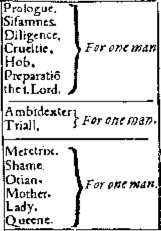Tragic mirth: King Cambyses
At about the same time as the courtly and academic Gorboduc was written, a play of a much more popular type appeared: A Lamentable Tragedy, Mixed full of Pleasant Mirth, Containing the Life of Cambyses, King of Persia.*
Cambyses (its short title) mixes "real" characters like King Cambyses with morality characters like Shame, Diligence, Common's Cry, Cruelty, and Murder. In this part of the list of dramatis personae, notice the way that the parts were doubled, so that a touring company of limited size could play it. (Click here for more on doubling* parts.)
The most active character in the play is one called Ambidexter, the Vice (the name implies that he uses both hands for double-dealing). Clowns were one of the ancestors of the Vice. (Click here for more on Ambidexter.*)
A splendid speech
Shakespeare certainly knew the play Cambyses, for it is Falstaff again who says, when he wishes to sound dramatically "royal," that he will "speak in passion . . . in King Cambyses' vein" (Henry IV, Part One, 2. 4. 386-387):
(Stage direction) Enter the KING, without a gown, a sword thrust up into his side, bleeding.
"King: Out, alas! What shall I do? My life is finished.
Wounded I am by sudden chance, my blood is [di]minished.
God's heart, what means might I make my life to preserve?
Is there naught to be my help, nor is there naught to serve?
Out upon the court and lords that there remain!
To help my grief in this my case will none of them take pain?
. . . I feel myself a-dying now; of life bereft am I;
And Death hath caught me with his dart; for want of
blood I spy [expire].
Thus gasping here on ground I lie; for nothing do I
care.
A just reward for my misdeeds my death doth plain
declare."
The wonderfully graphic stage direction then follows: "Here let him quake and stir."
Footnotes
-
Equivocal titles
Compare the title of the play-within-the-play in A Midsummer Night's Dream (5. 1. 56-7):
A tedious brief scene of young Pyramus
And his love Thisbe; very tragical mirth. -
Juggling parts
As this portion of the title-page to Cambyses shows, travelling companies of players often managed to put on plays with many more parts than there were actors. The parts here show how important the Vice was, since he was able to take only one other minor part.
All the parts of women in the play were to be played by one actor. ("Meretrix" means "courtesan.")
Some of the actors in Shakespeare's plays may have doubled parts--and the doubling may have added meaning to the performance: consider the effect of Theseus and Hippolyta doubling Oberon and Titania, or Cordelia doubling the Fool. (Click for more on the acting companies.)
-
Ambidexter goes to war
(Stage direction) Enter the VICE, with an old capcase [hatbox] on his head [i.e., as helmet], an old pail about his hips for harness [armour], a scummer [skimming-ladle] for a sword, and a pot lid [for a shield] by his side, and a rake on his shoulder.
He affects great bravado, but we quickly learn that he is out to fight--a snail. Ambidexter combines the tradition of the Vice of the morality plays with the miles gloriosus (braggart soldier) of Roman comedy; he provides a steady source of slapstick comedy.
